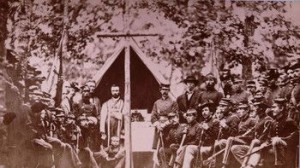 Today James B. Taylor, influential Virginia Baptist minister who is serving as pastor of Richmond’s Grace Street Baptist Church, opens the Virginia House of Delegates with prayer. A large portion of today’s business relates to the problem of alcohol within the Confederacy. An 1863 bill limits the use of grains for distillation into alcohol, yet the law does not go far enough for some delegates. The basis of the bill is that too many farmers are selling their food crops for alcohol at a time when many Southern families are daily living in hunger. Today’s proposed amendment to the bill to prohibit farmers from selling their fruits for use in alcohol production is defeated handily, as are a series of other proposed amendments to expand the scope of the anti-alcohol bill.
Today James B. Taylor, influential Virginia Baptist minister who is serving as pastor of Richmond’s Grace Street Baptist Church, opens the Virginia House of Delegates with prayer. A large portion of today’s business relates to the problem of alcohol within the Confederacy. An 1863 bill limits the use of grains for distillation into alcohol, yet the law does not go far enough for some delegates. The basis of the bill is that too many farmers are selling their food crops for alcohol at a time when many Southern families are daily living in hunger. Today’s proposed amendment to the bill to prohibit farmers from selling their fruits for use in alcohol production is defeated handily, as are a series of other proposed amendments to expand the scope of the anti-alcohol bill.
Meanwhile, today’s edition of the Georgia Baptist Christian Index carries a recent letter from a Southern Baptist army chaplain identified as “W.” The chaplain surveys religious movements within the army, compliments Gen. Robert E. Lee for issuing new rules to enforce observance of the Sabbath, and (echoing the complaints of other Baptists ministering among the army camps) offers a bit of criticism regarding the lack of Baptist chaplains in the field.
We held on yesterday a very pleasant meeting of our Chaplains’ Association. A large number of chaplains were present and the reports elicited showed a very healthful religious feeling throughout the army. A revival was reported as in progress in Davis’ Miss. Brig., in which nine had professed conversion and seventy were inquiring the way to life.–There is also an interesting state of things in Kirkland’s N.C. Brigade, and in the 1st N.C. Reg. The good work commenced in Wilcox’s (old) Brig. last summer seems to be reviving. In one of the Regiments there I have heard of men going out in the snow bare-footed to attend the nightly prayermeeting which was held out doors for want of a chapel. We had no report from Wright’s Ga. Brig. but I trust that the revival reported there is still in progress. In a number of other Regiments and Brigades increased interest in the prayer meetings, Bible classes, &c., was reported. A committee appointed at the last meeting to visit Gen. Lee with a view to see if something could not be done for the better observance of the Sabbath, reported that they were received with the utmost cordiality, and presented an order on the subject just issued from headquarters. I will send you a copy. Gen. Lee was present at this meeting, and seemed deeply interested in the proceedings. He is a fast friend of the chaplains, and manifests a lively interest in their work.
There was an interesting statement made of the increase of laborers in the army since Feb. ’63. Then over half of the Reg. were unsupplied with chaplains, and there were whole Brigades without a single chaplain–now over two thirds of the regiments have chaplains and the number of missionaries is much larger than ever before. Still, there is need of more chaplains–and especially of more Baptist chaplains as we having nothing like our proportion. The only thing that would palliate the conscription of ministers would be that it would fill up all the vacant chaplaincies. I know a Virginia Baptist minister, who once stood high as a useful pastor, who claims exemption from military duty on the ground of being a minister, and who yet has scarcely preached a sermon for twelve months, but spends his time in selling calico, ginger-bread, pea-nuts, &c., at the highest obtainable prices. He cannot please necessity for his course since he has only one child and is worth about one hundred thousand dollars….
While many Baptist ministers decline to serve as army chaplains due to a belief in church state separation (one of the few areas during the war years in which many Baptists of the South actually remain faithful to their traditional beliefs concerning church and state), others are perhaps concerned about the well-being of their families. Regardless, some Baptists, such as today’s letter writer, are adamant that it is the duty of Baptist ministers to support the Confederacy, God’s chosen nation (Baptists’ church-state separation heritage being discarded in the matter of nationalist identity).
Sources: Journal of the House of Delegates of the Commonwealth of Virginia for the Session 1863-1864, pp. 188-193 (link); “Army Correspondence of the Index,” Christian Index, February 26, 1864; see also Bruce T. Gourley, Diverging Loyalties: Baptists in Middle Georgia During the Civil War, Macon, Ga.: Mercer University Press, 2011 (link)


